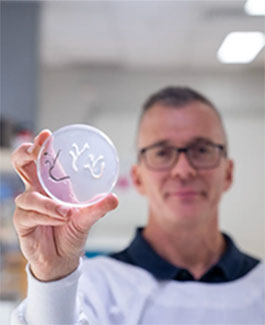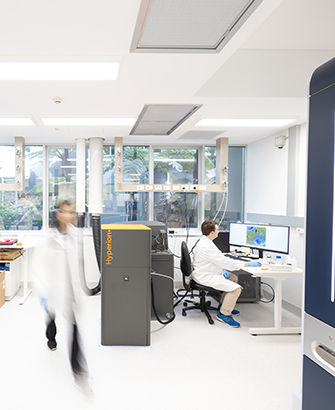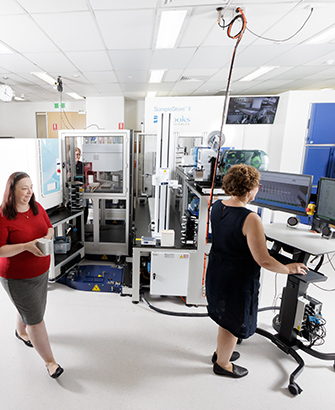Innovation, discovery and translational research
Driven by a relentless pursuit of innovation, our globally acclaimed research leaders and their dedicated teams are committed to discovering breakthroughs that pave the way for next-generation drugs, vaccines, and diagnostics. Through translational research, they transform their findings into meaningful advancements, significantly improving community health outcomes worldwide.
Our major research themes
Cancer
Cancer is a significant global health issue and a leading cause of death worldwide. Our specialists are exploring a wide range of treatments, tackling challenges such as drug resistance, and advancing diagnostic technologies for various cancers including breast, ovarian, prostate, lymphoma, melanoma, sarcoma, brain tumours and rare cancers. Our research and key clinical collaborators place us at the cutting edge of cancer glycomics, a field that examines the interactions between sugar molecules and proteins on the surface of cancer cells. Our researchers are leveraging this innovative approach to discover new solutions for cancer diagnosis and treatment.
Infectious diseases
Infectious diseases represent some of the most significant health challenges globally, claiming millions of lives each year. There is an urgent need to develop new strategies to combat diseases caused by bacterial, viral, parasitic and fungal pathogens. The rising threat of antibiotic resistance further exacerbates this global concern. Our experts are committed to discovering innovative approaches to address antibiotic resistance and the shortage of effective vaccines for some of the world’s most serious viral and bacterial pathogens.
Neurological conditions
Neurological conditions are characterised by the progressive degeneration of the structure and function of the central and peripheral nervous systems, leading to issues with movement and mental function. As the global population ages, the number of people affected by these conditions is expected to rise. Our experts are addressing conditions such as spinal injury, neurodegeneration, peripheral nerve repair, axon degeneration, Parkinson’s disease, mental health, PTSD and pain. Their goal is to deliver solutions that significantly improve the quality of life for individuals with diseases and injuries of the nervous system.
Our centres of excellence

Fraunhofer Item & Institute for Biomedicine and Glycomics Joint Laboratory for Anti-infective Research
Research experts
Our world-class researchers work with industry, community and government partners to better understand our world and improve people’s lives
Clinical trials
Translational clinical studies—including clinical trials—test laboratory-based findings in volunteer participants. Depending on the research aim, studies may involve collecting and analysing samples from individuals with specific diseases, evaluating the performance and effectiveness of new diagnostic tests, or assessing the effectiveness of new interventions, such as experimental drugs or vaccines.
Griffith University's Clinical Trial Unit offers translational research services to Griffith staff and students, professional site services to commercial clients, and opportunities to participate in clinical research in a supportive and safe environment.
Study with us
Study alongside some of the world's most experienced and well-known research leaders and scientists and help us fight for a healthier future for all.
Latest news
Saliva and plasma at the core of cancer detection and treatment
05 Dec 2025
Saliva and plasma could be crucial in detecting recurrences or relapses of head and neck cancers,...
Understanding how cells talk at the core of new health hub
03 Nov 2025
Understanding how cells communicate with each other to fuel diseases such as cancer is at the...
$2.5m NIH grant for malaria vaccine research
17 Sep 2025
Griffith University has been successful in securing a prestigious National Institute of Health...
De-mystifying common misconception about the prevalence of legionella bacteria
05 Sep 2025
There is a common misconception that legionella is only found in air conditioners and water towers,...
World-first clinical trial commences to treat spinal cord injury
14 Aug 2025
A Phase 1 human clinical trial to treat chronic spinal cord injury, the first of its kind in the...
Revolutionary saliva test for liver disease receives a boost
03 Jun 2025
A ground-breaking test to diagnose liver fibrosis has received a boost after lead researcher,...
Contact us
Institute for Biomedicine and Glycomics
Griffith University
1 Parklands Dr
Southport QLD 4215
170 Kessels Rd
Nathan QLD 4111




